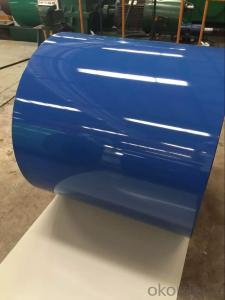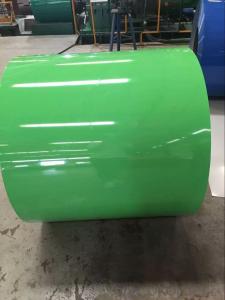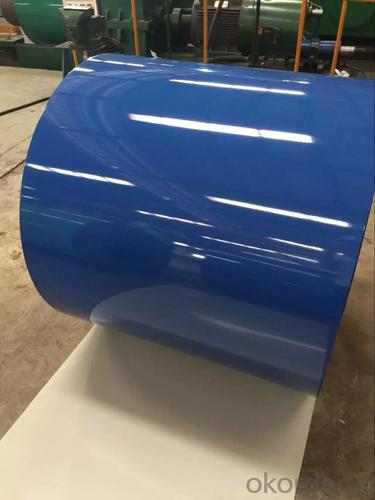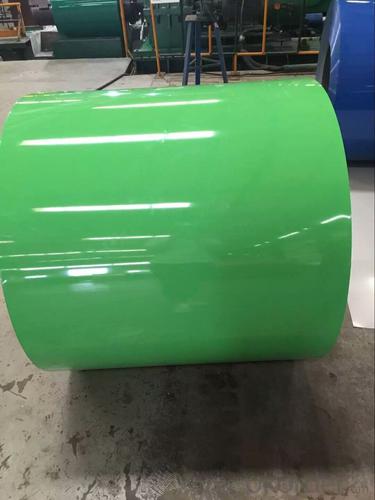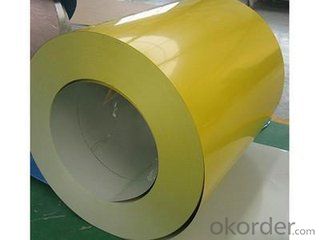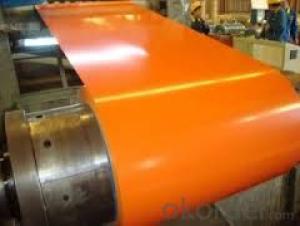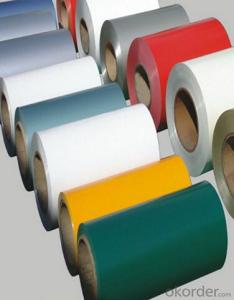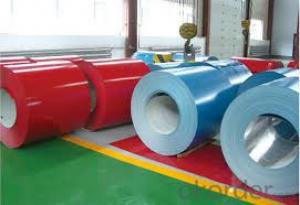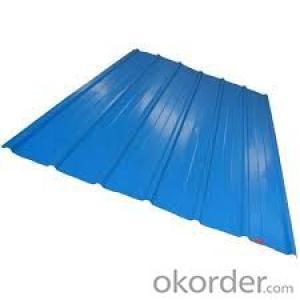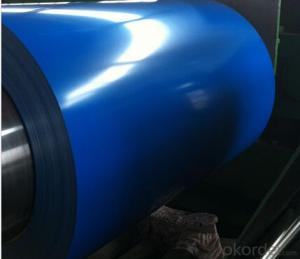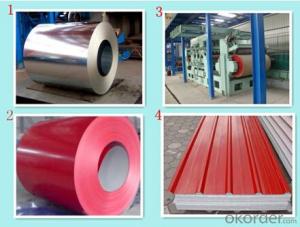PPGI Steel coils factory Prepainted color steel coil for roof
- Loading Port:
- Tianjin
- Payment Terms:
- TT OR LC
- Min Order Qty:
- 25 m.t.
- Supply Capability:
- 100000 m.t./month
OKorder Service Pledge
OKorder Financial Service
You Might Also Like
Specification
We have devoted to manufacture steel coils for 13 years. As the biggest manufacture in Hebei China, we have two large factory and 8 production lines, sincerely welcome to your visit if possible.
1, Production Introduction: PPGI are prepainted galvanized steel coils, used for making roof, advantage is can be used at least 10 years.
2, Product feature:
① We're factory, products has the best price for you.
② We have 8 production lines, have the fastest delivery time for order
③ All colors can be produced by our factory.
④ Product can accept any test before shipment.
3,Parameter list:
① Product Name:PPGL
②Thickness:0.2-1.0MM
③ Width:914-1250MM
④ Az Coating:30-275 G/M2
⑤Coil Weight:3-5MT
⑥Coil ID:508MM
⑦Packing :Standard Export Seaworthy Shipping Packaging
⑧Payment Terms:30% T/T in advance, 70% balance within 3 working days against the copy of B/L Or irrevocable LC at sight
⑨Delivery Time:
10 days after advance is confirmed if order≤100MT
15 days after advance is confirmed if 100MT≤order≤200MT
20 days after advance is confirmed if 200MT≤order
4,
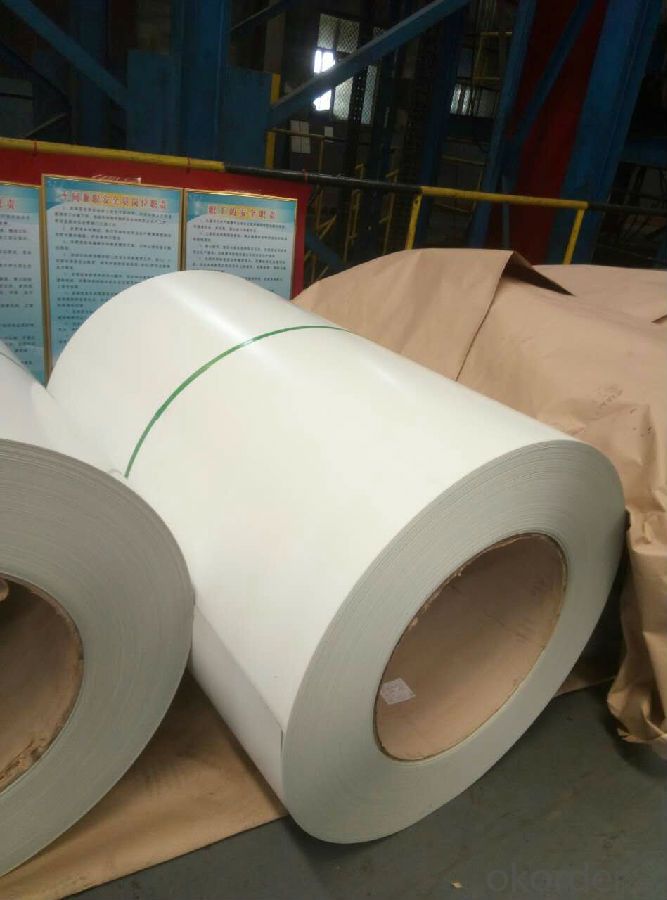
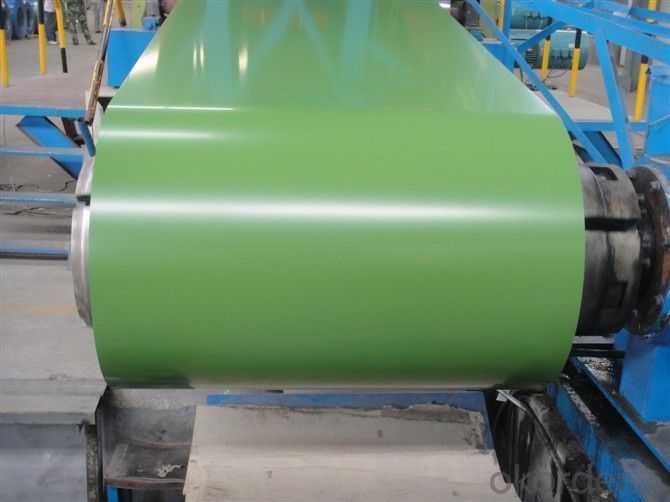
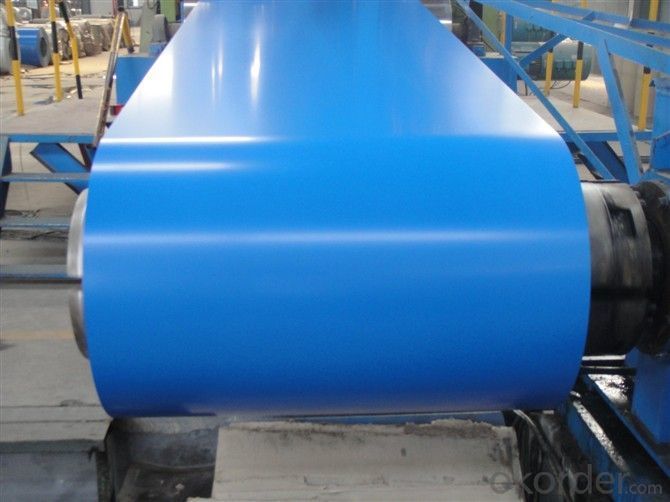
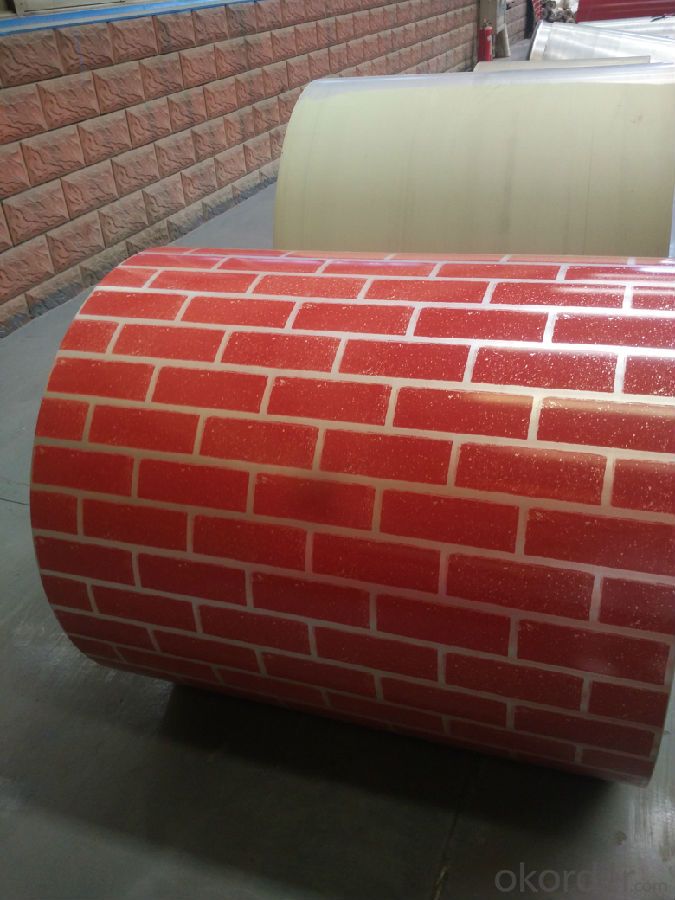
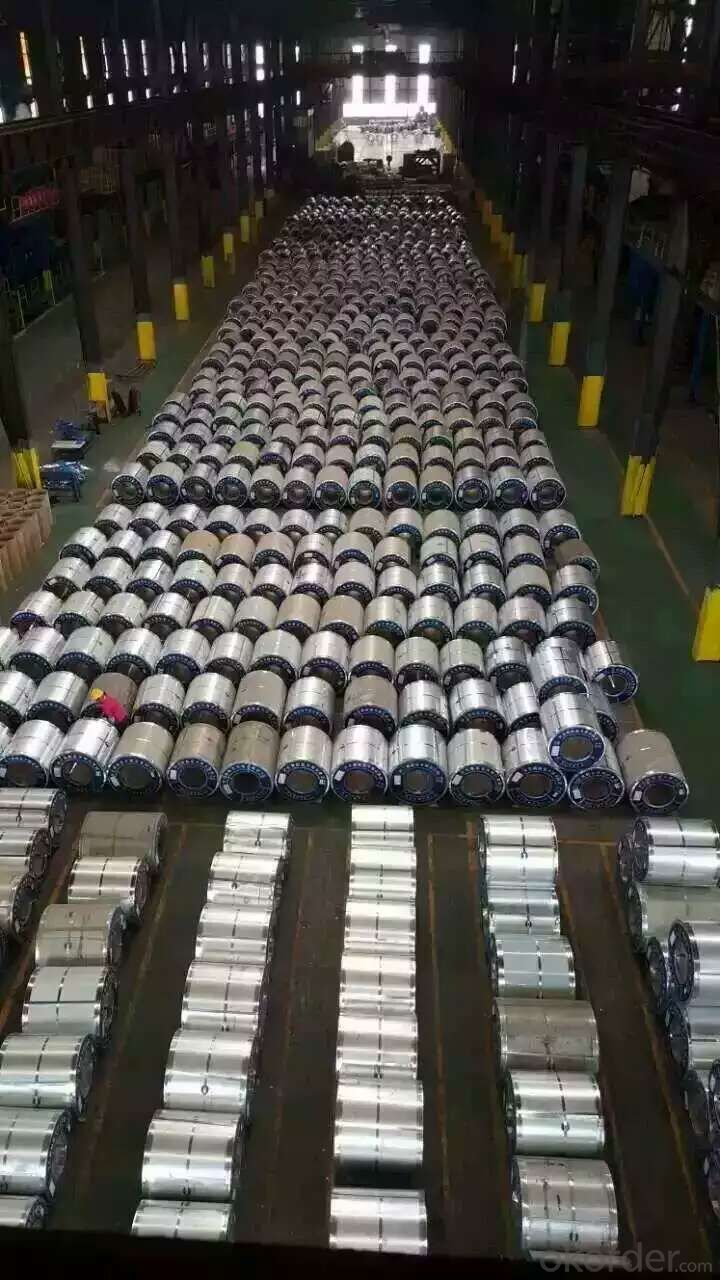
- Q: so i've started learning to play guitar in the past few weeks, and i'm using my sister's old guitar which isn't in very good condition, so i'm planning on buying a new one, but which would be better to buy, nylon string or steel string?
- It rather relies upon on what type of music you're enjoying, nylon string guitars have a mellow, softer tone than steel strings, the feel of the nylon strings (a minimum of to me) are reliable, in my opinion, i might ought to declare nylon is extra suitable, large for finger choosing and a effective tone. once you're searching for a guitar, you are able to flow out to a close-by guitar save, and attempt the two out for your self, in straight forward terms then will you comprehend for specific.
- Q: I am buying my boyfriend a steel guitar for our one year anniversary and I was curious what brand or company I should look into. I want something high quality yet traditional. Money is not really an issue but I don't exactly want to spend an arm and a leg either.Thank you in advance!
- The term steel guitar usually refers to pedal steel guitar or lap steel guitar. I suspect that you really meant to ask about a steel stringed guitar for your boyfriend. Steel guitars are played with a slide and are usually electrified. A pedal steel guitar site on legs and a lot of the chord changes are made with knee levers or foot pedals. If that's what your boyfriend is looking for, expect to spend a couple of thousand dollars. Look for brands like Emmons, Carter, Sho-Bud, or Fessenden. Carter Starters have been discontinued, but you might find one for under a thousand.
- Q: Me and my cousin have been arguing about this. I said that superman is made out of steel, but he says that people just call him the man of steel because he's hard like steel. Does he have steel in his body?
- Superman okorder /
- Q: I want to anodize steel using heat. some steel turns gray instead of coloring when I heat it up using a torch.
- Steel doesn't anodize in the sense that aluminum and some other metals do. However, it can be heat-colored. The trick is to clean the surface first (it must be oxide free), then heat gently until the colors appear. These are called temper colors in steel. They are due to a thin adherent layer of oxide that forms and thickens as temperature is increased. They are quite temperature dependent. As the steel is heated, the first color to appear is pale yellow. This will progress through darker yellows, browns, purples, and blues as the temperature rises. Above blue, the oxide becomes the gray/black color you are apparently getting - this is the result of heating too fast and too hot. See the chart at the site below for colors in plain carbon steel. Note that the temperatures are pretty low - It all starts around 400 F and if you go above 600 F the show's all over.
- Q: How are steel coils used in the manufacturing of fasteners?
- Steel coils are commonly used in the manufacturing of fasteners because they provide a cost-effective and efficient way to produce large quantities of fasteners. The steel coils are unwound and then fed into machines that cut, shape, and thread the steel to create various types of fasteners such as screws, bolts, and nails. The high strength and durability of steel make it an ideal material for fasteners, ensuring secure and reliable connections in a wide range of applications.
- Q: How are steel coils used in the production of construction components?
- Steel coils are used in the production of construction components in various ways. One common use is for the manufacture of steel beams and columns, which are essential structural elements in buildings and other large structures. The steel coils are processed and shaped into the desired dimensions, then cut and welded to form the beams and columns. Steel coils are also used in the production of roofing and wall cladding materials for construction. These coils are often coated with protective layers to enhance durability and resistance to corrosion. The coils are then shaped and formed into roofing sheets, wall panels, or siding materials that provide both aesthetic appeal and functional protection to the building. Another important application of steel coils in construction is for the production of reinforcing bars, commonly known as rebar. Rebar is used to provide strength and stability to concrete structures, such as foundations, slabs, and walls. The steel coils are processed and cut into specific lengths, then shaped and twisted to form the required reinforcement bars, which are then embedded within the concrete during construction. Furthermore, steel coils can be used in the production of various other construction components, such as pipes, tubes, and profiles. These components are used for plumbing, heating, ventilation, and other structural applications. The steel coils undergo different manufacturing processes, including rolling, welding, and shaping, to achieve the desired dimensions and properties of these components. In summary, steel coils play a crucial role in the production of construction components. They are used to manufacture steel beams, columns, roofing and wall cladding materials, reinforcing bars, pipes, tubes, and profiles. These components are vital for the construction industry, as they provide strength, durability, and functionality to buildings and other structures.
- Q: what is the difference between metal and steel
- well, steel is a type of metal. It's sort of like asking the difference between a bug and an ant, an ant is a bug, but not every bug is an ant. Likewise, steel is metal, but not all metal is steel. Gold is metal, Silver is metal, Iron is metal, Steel is metal.
- Q: I am searching for an online article which discusses any aspect of the use of austenitic stainless steels. I was just wondering if anyone could help me find one. No sales articles. Thank you!
- *Austenitic, okorder
- Q: I know the law regarding selling steel core ammo, but is it possible to buy a steel core bullet and load it yourself?
- You don't know the law regarding selling steel core ammo quite as good as you think you do.
- Q: Are steel coils used in automotive manufacturing?
- Yes, steel coils are commonly used in automotive manufacturing. They are used to produce various components such as body panels, chassis parts, and suspension components. The high tensile strength and durability of steel make it an ideal material for creating safe and robust automobiles.
Send your message to us
PPGI Steel coils factory Prepainted color steel coil for roof
- Loading Port:
- Tianjin
- Payment Terms:
- TT OR LC
- Min Order Qty:
- 25 m.t.
- Supply Capability:
- 100000 m.t./month
OKorder Service Pledge
OKorder Financial Service
Similar products
Hot products
Hot Searches
Related keywords
